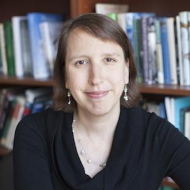Most people are surprised when I tell them that I was a terrible student. Bored, restless, and rarely taking notes in class, I was the one scribbling caricatures of the teacher as a sheep, snail, or space alien. I’d spend the hours staring at the clock, checking off each minute on the edges of my notebook like a prisoner checking off days in prison. And yes, science was my most dreaded subject.
So, you may ask, how did I ever land in the world of science education? Wouldn’t I immediately run as far away from schools as possible? Hardly. The frustration and exasperation and boredom that I felt as a student has driven me to ensure that students should never have their time wasted. And I can tell you from my interaction with educators since starting at NCSE, I am rarely disappointed. I constantly run into fabulous educators, innovators, folks who love to engage with their students and share their awe of and excitement about science. Science teachers in America are, on the whole, doing great.
But then, periodically, I have my heart desperately and tragically broken by a teacher who is invested in creationism, a science reporter who recommends the terminology “it’s just a theory”, or as in West Virginia recently, a state board of education that encourages educators to “teach the controversy” over climate change by mutilating science standards.
In case you missed the latest article in the Charleston Gazette or my colleague Mark McCaffrey's op-ed piece in the same newspaper, the perfectly sensible Next Generation Science Standards were adopted last month by the state board of education in West Virginia, with some glaringly inaccurate edits regarding—surprise, surprise—climate change.
From the article:
“There was a question in there that said: ‘Ask questions to clarify evidence of the factors that have caused the rise in global temperatures over the past century,” [board member Wade] Linger said. “... If you have that as a standard, then that presupposes that global temperatures have risen over the past century, and, of course, there’s debate about that.”
Linger suggested adding the words “and fall” after “rise” to the sixth-grade science standard. The change was adopted.
Moreover the ninth grade standards were changed from:
“Analyze geoscience data and the results from global climate models to make an evidence-based forecast of the current rate of global or regional climate change and associated future impacts to Earth systems.”
to:
“Analyze geoscience data and the predictions made by computer climate models to assess their creditability [sic] for predicting future impacts on the Earth System.”
Without getting into the myriad of problems with these changes, which you can read more about here and here, my real problem is with what this tells students. Why even bother having a science class if we can’t assure the students that they are learning science? Why waste students’ time? Why not just let them spend the hour texting their friends or playing video games? At least then the adults in their lives couldn’t be blamed for the unscientific things they learned.
Perhaps I’m being a bit dramatic. But it’s hard not to think about a younger me, sitting in science class, ticking off the minutes and seconds until I could get out. We have to make sure that this doesn’t happen. If we compromise science for the sake of ideology, we are not fighting for those students. Rather, by having them learn inaccurate information in a science class, we are just telling them that science education isn’t worth their time. That is the greatest tragedy of all, and it breaks my heart.


